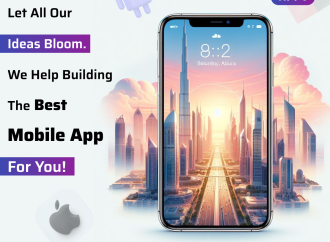The COVID-19 pandemic has forced us to change the way we live, work, and communicate. With social distancing becoming a norm, technology has proven to be a critical enabler in helping us stay connected with friends, family and co-workers. As we enter into a post-pandemic world, there are high expectations from next-generation telecom technology –
The COVID-19 pandemic has forced us to change the way we live, work, and communicate. With social distancing becoming a norm, technology has proven to be a critical enabler in helping us stay connected with friends, family and co-workers. As we enter into a post-pandemic world, there are high expectations from next-generation telecom technology – 5G. The fifth generation of cellular networks promises faster speeds, lower latency and increased connectivity which can transform industries like healthcare, education and entertainment. In this blog post, we will explore the role of 5G in shaping our future and what you can expect from this cutting-edge technology.
What is 5G?
The next generation of wireless technology is 5G, and it promises to deliver much faster speeds and lower latency than its predecessors. But what exactly is 5G, and how will it impact our lives?
5G is the next generation of wireless technology that promises to deliver faster speeds and lower latency than its predecessors. 5G will enable a new era of connectivity, allowing us to connect to the internet at unprecedented speeds. With 5G, we’ll be able to download movies in seconds, stream live video with no buffering, and play online games without lag.
But 5G isn’t just about faster speeds. It’s also about lower latency, which is the time it takes for data to travel from one point to another. With 5G, we’ll see a significant reduction in latency, which means that we’ll be able to interact with the world in real-time like never before.
5G will have a profound impact on our lives, connecting us like never before. It will change the way we work, play, and communicate. And it will do all of this at lightning-fast speeds.
What are the benefits of 5G?
In a post-pandemic world, 5G will play a crucial role in enabling continued economic growth and improving quality of life. The benefits of 5G include:
1. Increased capacity and speeds: 5G will provide increased capacity and speeds, allowing for more devices to be connected and reducing congestion.
2. Low latency: 5G will have low latency, meaning that there will be less delay between when a user sends a request and when they receive a response. This is critical for applications such as virtual reality and autonomous vehicles.
3. Enhanced security: 5G will enhance security by using advanced encryption methods and providing isolation between different users on the network.
4. Improved battery life: 5G will improve battery life by using shorter wavelengths that require less power to transmit data.
5. Reduced costs: The deployment of 5G infrastructure will be less expensive than previous generations of telecom technology, making it more accessible to service providers and consumers alike.
How will 5G change the way we live and work?
The fifth generation of cellular network technology, 5G, is now available in many parts of the world. This next-generation telecom technology promises faster data speeds, lower latency, and more capacity than ever before. But what does that mean for how we live and work?
Faster data speeds will enable new and innovative applications that require large amounts of data to be processed quickly. For example, real-time video streaming and virtual reality applications will become more realistic and widespread with 5G. And because 5G has the potential to connect devices at very low latencies, it could enable new IoT applications that require real-time response times, such as connected cars and automated factories.
In terms of capacity, 5G will be able to support far more devices than 4G LTE networks. This means that we’ll see a proliferation of connected devices in our homes and workplaces as the costs of connecting to a 5G network come down. Everything from our refrigerators to our light bulbs could be connected to the internet and sending us data about their usage patterns.
All of these changes will have a profound impact on how we live and work. We’ll be able to do things that were previously impossible or impractical due to limitations in technology. The way we interact with the world around us will change as we become increasingly reliant on digital devices and services. And as more industries adopt 5G technology, we can expect to see even more transformative changes in the years to come.
What are the challenges of 5G?
The challenges of 5G are numerous and complex. First,5G technology is still in its infancy and has not been fully developed or deployed. Second, 5G networks are much more complex than previous generations of wireless networks, making them more difficult to deploy and operate. Third, the high speeds and low latency of 5G will require a significant upgrade to existing infrastructure, including cell towers and backhaul networks. Fourth, the spectrum required for 5G is scarce and expensive, making it difficult for carriers to deploy nationwide 5G networks. Finally, 5G will require new business models and revenue streams to sustain investment in the technology.
How to get ready for 5G
In order to take full advantage of 5G technology, telecom providers need to upgrade their networks and infrastructure. Here are a few things you can do to get ready for 5G:
1. Check with your service provider to see if they offer 5G service in your area.
2. If they do, find out what kind of speeds you can expect and whether or not you’ll need a new device that’s compatible with 5G.
3. Upgrade your home network by adding a 5G router or upgrading your modem/router combo unit to one that supports 5G. This will ensure that you’re getting the best possible speeds when using 5G services.
4. Be aware of the potential for higher data usage with 5G. If your service plan has data limits, you may want to consider upgrading to an unlimited data plan or finding a provider that offers more generous data allowances.
5. Keep an eye on battery life when using 5G-enabled devices, as the extra power required for faster speeds can drain batteries more quickly than usual.
Conclusion
It is no doubt that 5G technology has the potential to revolutionize our world in many ways. From enabling faster, more reliable communication networks to improving healthcare services and allowing for the development of new technological applications, the possibilities are seemingly endless. With the right investments and infrastructure put in place, we can expect to see a multitude of benefits from 5G technology as we slowly transition into a post-pandemic world.





















Leave a Comment
Your email address will not be published. Required fields are marked with *